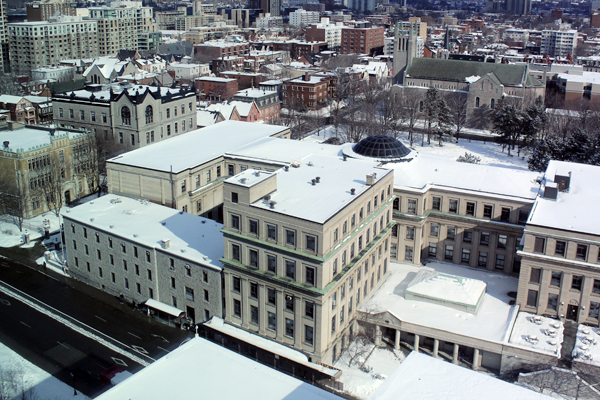A debate over technology-free zones in parks
Kaitlynne-Rae Landry | Fulcrum Contributor
Illustration by Tina Wallace
THE SUN IS rising, slowly burning up the morning mist while you stand at the edge of a clearing. This moment makes your early morning hike worthwhile. You can see a doe at the other edge of the clearing, enjoying the dew-wet grass. All you can hear is the sound of the birds singing their—
“No, I can’t do it right now! I’m in the middle of some godforsaken forest—the kids want to see something wild.”
The deer’s head snaps up and she flees, white tail flashing briefly before she is gone. The serene morning is broken, the birds now silent. Furious, you turn to see who has the audacity to ruin such a perfect moment, and there they are: the epitome of how far humanity has strayed from nature.
A man is on his smart phone talking loudly, while looking at something else on a tablet. His kids are close behind him, one so glued to his gaming device that he plows into his father when he stops. The other listens to music loud enough to hear from 15 metres away. They’ve ventured out to the park to see nature, and sure, they’re in the thick of it, but are they really experiencing it?
We live in a world that is increasingly invaded by technology; there are few spaces left where we are free of these distractions, and we can reconnect with something more simple, pure, and natural. Yet with the increase in portable technology, even these rare spaces are threatened. In response, a movement towards the concept of unplugging has begun. Recently, some Marriott hotels in the Caribbean sought to designate some outside spaces as “braincation” zones free of technological devices and their distractions. Should this designation also be brought to our national parks?
There is something truly wonderful about enjoying the rain instead of worrying about whether or not my assorted electronics will get ruined. I also feel a sense of freedom when I go exploring and see things through two original lenses—my eyes—instead of an Instagram filter.
I’m not denying the huge potential of technology to make nature more accessible. Being able to research species of flora and fauna and read about ecosystems while exploring them is a fantastic opportunity for teachers, parents, and students to expand their knowledge and appreciation of the natural world. I believe that an absolute ban on technology in national parks would be a disservice. The Marriott hotels are on to something: zones are the answer.
Technology-free zones and zones aiming to preserve the natural setting provide compromises to attract people on both sides of the debate. Utilizing technology–friendly zones would attract the plugged in crowd to use technology in a way that increases knowledge. We have the technology to share information electronically and this would expand our understanding of parks and wildlife.
In the United States, there have been discussions about adding expanded WiFi connection to their parks. Nature enthusiasts strongly opposed the idea. The park systems in both countries cannot deny the fact that technology constantly evolves and that people are becoming more attached to their technological devices. It is detrimental for the park systems if they do not adapt and embrace these changes. In order to thrive, they have to allow every person to experience and enjoy the beauty of the natural world, whether or not they rely on technology.
Studies show that the ability to disconnect and be free of these electronic tethers is important to our well-being and psyche. It is also the park systems’ responsibility to preserve areas where people can enjoy the outside world and have quiet conversations with fellow humans in real time, face to face. The balance of compromise—and the ability to preserve the rights of both the willingly plugged in and the unplugged—must be protected and maintained by the park services.





